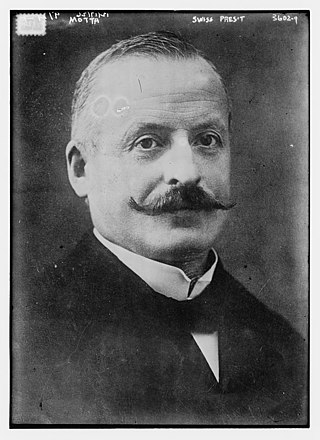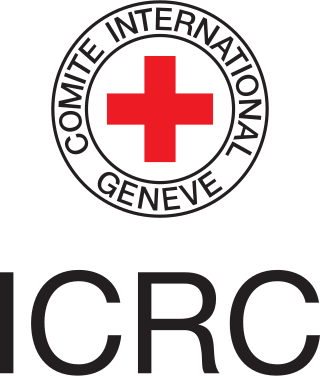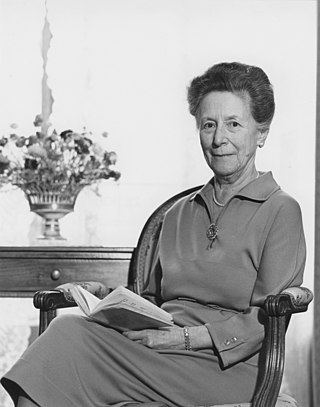
Jakob Kellenberger (born 19 October 1944 in Heiden, Switzerland) is a former Swiss diplomat and former president of the International Committee of the Red Cross (ICRC). Since 2013 he has been the president of swisspeace. [1]

Jakob Kellenberger (born 19 October 1944 in Heiden, Switzerland) is a former Swiss diplomat and former president of the International Committee of the Red Cross (ICRC). Since 2013 he has been the president of swisspeace. [1]
Jakob Kellenberger was born in the Swiss canton of Appenzell in 1944.
Kellenberger studied French and Spanish literature at the University of Zurich. He also studied at the Graduate Institute of International Studies in Geneva between 1974 and 1975. During his studies, he spent time in Tours, France, and Grenada, Spain. He wrote his undergraduate dissertation on Jean-Jacques Rousseau and his doctoral thesis on the Spanish playwright Pedro Calderón de la Barca. He completed his studies with a doctorate in literature from the University of Zurich.
While still a student, Kellenberger married Elisabeth Jossi. They have two daughters.
In 2013, Kellenberger was appointed as President of the swisspeace Foundation Board which establishes and oversees the annual and longer-term strategic work program for swisspeace and accepts the annual financial statements and budget. It also formulates and develops the guiding principles for swisspeace's work. [2]
Jakob Kellenberger entered the Swiss diplomatic service in 1974. [3] He was posted to Madrid, then to Brussels and subsequently to London. From 1984 to 1992, he headed the joint office of the Swiss Ministries of Foreign Affairs and Economic Affairs in charge of the relations to the European Union and EFTA, and in 1988, he was promoted from the diplomatic rank of minister to ambassador. From 1989 to 1991, he headed the transport (transit) negotiations with the European Community on the Swiss side. In 1992, Kellenberger was appointed Secretary of State for Foreign Affairs. From 1992 to 1999, he held the posts of Secretary of State and head of the Directorate of Political Affairs within the Swiss Federal Department of Foreign Affairs. From 1994 to 1998, he was also coordinator and chief negotiator for Switzerland's sector-by-sector bilateral negotiations with the European Union. [4]
On 1 January 2000, Jakob Kellenberger was appointed president of the ICRC, a humanitarian organization that, as of July 2011, has some 13,000 staff and a network of over 200 delegations. The scope of the ICRC's operations expanded considerably during his term in office.
The ICRC's large-scale operations in Afghanistan, Iraq, Sudan and the Near East had and partly still have a particular impact on Jakob Kellenberger's job, as also reflected by his field visits and efforts in the sphere of humanitarian diplomacy. Kellenberger made a decisive contribution towards more intensive cooperation in several spheres between the ICRC and the European Union and its member States. [5] Managing the ICRC's relationship with the United States after the September 11 attacks in the areas of law and humanitarian diplomacy was one of his greatest challenges. In difficult conflict situations, he considered it important to get first-hand experience of the reality on the ground, as witnessed by his trips to southern Lebanon during the war of summer 2006 and to Gaza in January 2009, and his numerous visits to Afghanistan and Darfur.
He stated on 5 April 2007 that the United States had inadequate procedures to guarantee the human rights of foreign detainees at the Guantanamo Bay detention camp in Cuba. He demanded a "more robust" system to determine whether to release hundreds of men who probably will never face trial. [6]
Jakob Kellenberger set great store by a clear strategy for the organization and the adoption of clear positions in a rapidly changing environment. He made a major contribution to achieving those goals.
Jakob Kellenberger lectures at the Swiss Federal Institute of Technology, the University of Salamanca, and the Graduate Institute of International and Development Studies. He also sits on the Board of the Centre for Humanitarian Dialogue (HD), a private diplomacy organization based in Switzerland. President or Swisspeace.

The organized International Red Cross and Red Crescent Movement is a humanitarian movement with approximately 16 million volunteers, members, and staff worldwide. It was founded to protect human life and health, to ensure respect for all human beings, and to prevent and alleviate human suffering.

Henry Dunant, also known as Henri Dunant, was a Swiss humanitarian, businessman, social activist, and co-founder of the Red Cross. His humanitarian efforts won him the first Nobel Peace Prize in 1901.

Giuseppe Motta was a Swiss politician. He was a member of the Swiss Federal Council (1911–1940) and President of the League of Nations (1924–1925). He was a Catholic-conservative foreign minister and a staunch opponent of communism and Stalinism.

Max Petitpierre was a Swiss politician, jurist and member of the Swiss Federal Council, heading the Political Department (1945-1961).

Heiden is a village and a municipality in the canton of Appenzell Ausserrhoden in Switzerland. Its Biedermeier village around the church square is listed as a heritage site of national significance.

The International Committee of the Red Cross (ICRC) is a humanitarian organization based in Geneva, Switzerland, and is a three-time Nobel Prize laureate. The organization has played an instrumental role in the development of rules of war and promoting humanitarian norms.

Pierre Krähenbühl is director-general of the International Committee of the Red Cross (ICRC), the organization’s second-highest-ranking position, a role he began in April 2024. He previously served as ICRC’s Director of Operations from 2002 to early 2014.

Cornelio Sommaruga was a Swiss humanitarian, lawyer and diplomat who is best known for having been President of the International Committee of the Red Cross (ICRC) from 1987 to 1999. He chaired the Geneva International Centre for Humanitarian Demining (GICHD) in Geneva. He was also active on a number of boards, such as the International Union Against Cancer. He was Chair of the Board of Directors of the Foundation For the Future, an organization dedicated to promoting human rights in the Middle East and North Africa, and the honorary President of Initiatives of Change International, a global organization dedicated to "building trust across the world's divides" of culture, nationality, belief, and background.

The Graduate Institute of International and Development Studies, also known as Geneva Graduate Institute, is a graduate-level research university in Geneva, Switzerland dedicated to international relations and development studies.

Alexandre Hay was a Swiss lawyer. From 1966 to 1976 he was Vice President of the Board of the Swiss National Bank. Later, from 1976 to 1987 he was President of the International Committee of the Red Cross (ICRC).

The Geneva Conventions are international humanitarian laws consisting of four treaties and three additional protocols that establish international legal standards for humanitarian treatment in war. The singular term Geneva Convention colloquially denotes the agreements of 1949, negotiated in the aftermath of the Second World War (1939–1945), which updated the terms of the two 1929 treaties and added two new conventions. The Geneva Conventions extensively define the basic rights of wartime prisoners, civilians and military personnel; establish protections for the wounded and sick; and provide protections for the civilians in and around a war-zone.
swisspeace - the Swiss Peace Foundation is a practice and research institute located in Basel, Switzerland promoting effective peacebuilding. Partnerships with local and international actors form the basis of its work. Together with its partner organizations, swisspeace manages strategies and interventions to reduce violence and promote peace in conflict-affected contexts.
Daniel Thürer is a Swiss jurist and professor emeritus of international, comparative constitutional, and European law at the University of Zurich. He is a member of the International Committee of the Red Cross, and of the Institut de Droit International, and presides the German International Law Association. Currently, he is a Fernand Braudel Senior Fellow at the European University Institute in Florence.
Nils Joachim Melzer is a Swiss academic, author, and practitioner in the field of international law. From 2016 until 2022, Melzer was the United Nations Special Rapporteur on Torture and Other Cruel, Inhuman or Degrading Treatment or Punishment. He is a professor of international law at the University of Glasgow. From 2011-2013, he was Swiss Chair of International Humanitarian Law at the Geneva Academy of International Humanitarian Law and Human Rights. Melzer has criticised the governments of the U.S., the U.K., Ecuador and Sweden over their treatment of Julian Assange.

Jean Simon Pictet was a Swiss citizen, jurist, legal practitioner working in international humanitarian law. First as a secretary-jurist, and then as a senior executive and Vice-President of the International Committee of the Red Cross (ICRC), Pictet was instrumental in drafting the 1949 Geneva Conventions for the protection of victims of war, their Commentaries, and negotiating the 1977 Additional Protocols. He also proposed the Red Cross Movement’s seven Fundamental Principles, which were adopted at Vienna in 1965: Humanity, Impartiality, Neutrality, Independence, Voluntary Service, Unity and Universality. In 1989, an international humanitarian law competition for students was founded and named after him.

Yves Daccord, is a humanitarian leader, international strategist, influencer and changemaker. From 2010 – March 2020 Yves was Director-General of the International Committee of the Red Cross (ICRC), a global humanitarian organization employing 20,000 staff. A former journalist, TV producer and international relations expert, his ICRC career spanned more than two decades in a variety of posts and challenging contexts – including Israel and the Occupied Territories, Sudan, Yemen, Chechnya and Georgia. Daccord currently leads the Edgelands Institute Harvard University’s first-ever Pop-Up Institute. He also leads the #Principles4Peace initiative to reshape peace processes around the world. He also chairs the Board of Our Common Home, an organization that promotes civic participation to build solutions to our changing natural environment and the Board of the International Human Rights Film Festival of Geneva.

Peter Maurer is a Swiss diplomat who was the President of the International Committee of the Red Cross (ICRC) from 1 July 2012 until October 2022 and is currently President of the Basel Institute on Governance.

Marguerite "Meggy"Frick-Cramer, born Renée-Marguerite Cramer, was a Swiss legal scholar, historian, and humanitarian activist. She was the first woman to sit on the governing body of an international organization, when she was made a member of the board of the International Committee of the Red Cross (ICRC) in 1918.

Lucie Odier was a Swiss nurse from a Patrician family background. She became a leading expert at the International Committee of the Red Cross (ICRC) for relief actions to civilians. As only the fourth female member of the ICRC's governing body Odier helped to pave the way towards gender equality in the organisation which itself has historically been a pioneer of international humanitarian law.

Jacques-Louis-Edmond Chenevière, commonly known as Jacques Chenevière, was a Swiss poet, librettist and novelist from a Patrician family in Geneva. For more than sixty years, he also served as a humanitarian official in top-positions of management and organisation at the International Committee of the Red Cross (ICRC).